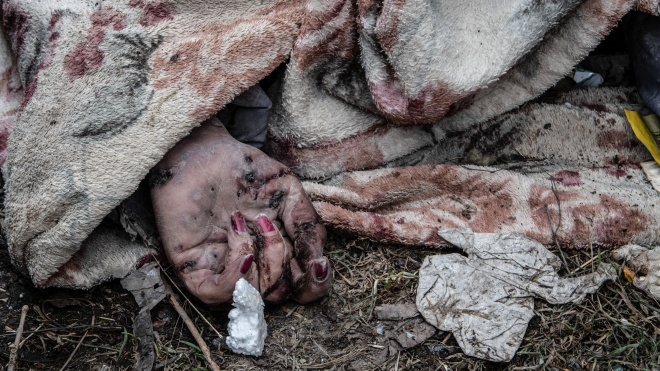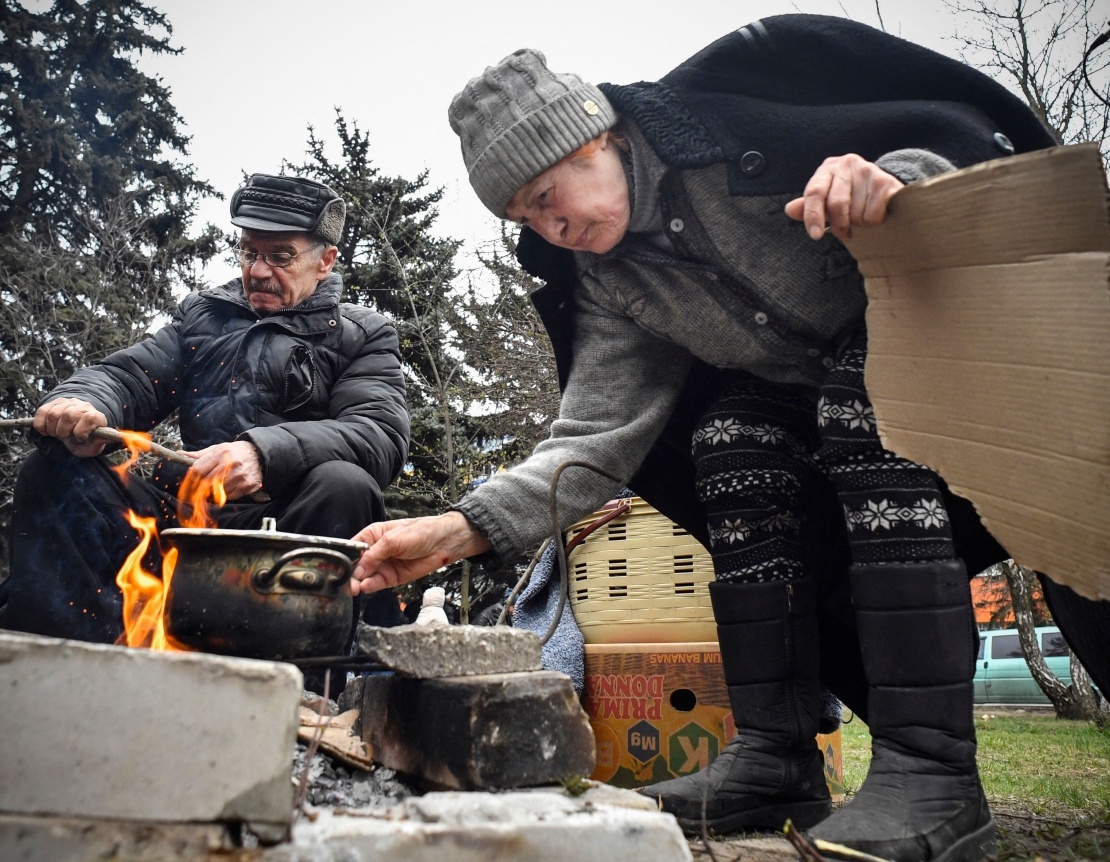1.
Like many others, I learned about the beginning of a full-scale invasion from social networks. I didnʼt panic: taking into account Putinʼs statement about the recognition of the "DPR" and "LPR" within the Donetsk and Luhansk regions and the escalation of the situation along the entire demarcation line, it was obvious that something would happen. Queues immediately lined up in stores: people bought everything. I asked for half a day off at work, and went shopping. If I had known that I had three months of survival ahead of me, I would have bought candles and some canned goods, not just a kilogram of minced meat and some vegetables. No one knew how it would be, many people thought the Russians would shoot somewhere on the outskirts, and that would be it. And it turned out to be a completely different story.
I tried to live like I did, because I worked as a caregiver and couldnʼt get depressed. There is a senior man who has health problems. I understood that I couldnʼt sit down and start whining about how bad everything was. So I lived as usual, cooked for the senior, talked to him. That is, at first, almost nothing changed for me.
I was alarmed when, on March 1, the electricity, water, and heating went out one after the other. There was a cellular connection for a few more days, but it also disappeared. My grandfather and I did not have a gas stove, only an electric one, so I agreed with my neighbor that I would cook hot food at her place once a day. But within a week, the gas also disappeared. Supplies of food and drinking water ran out just as fast, shops and pharmacies did not work. People bought products from opened warehouses and broken shops. Before the occupation, our soldiers were on duty there and monitored the situation to be orderly.
In such a situation, itʼs difficult to find something edible somewhere and prepare it on your own. I teamed up with my neighbors: an elderly woman and her adult son. The senior I cared about did not get out of bed, so the three of us looked for water, food, firewood and paper, and then I alone cooked for our entire company: for the caretaker, neighbors and myself.
Getty Images / «Babel'»
To get drinking water was the easiest: it was taken from the city water supply. A neighbor with her son usually went there. But one day they came under fire and when they were running away, the neighbor fell and sprained her leg. After that, I went with her son to get food and firewood. Only when it got warmer did the neighbor join us.
I felt like I was in a post-apocalypse, like everything that once existed in the city had been destroyed. From the very beginning, it was uncomfortable for me to go to broken-down stores for food: my conscience tormented me. But I understood that no one would bring the products, that it was normal to take them without payment at this time — because you have to survive. At some point I decided: if I survive, I want to tell everything about it. Thatʼs why I started keeping a diary on March 8. Since then, Iʼve been reliving Groundhog Day over and over again: I woke up in the morning, said hello to my neighbors, lit a fire, put on a kettle, and had tea. During the day, we collected firewood with our neighbors, decided what we would cook, cooked, ate, chatted, and went to bed in the evening. And it was like this every day.
2.
Sometime in the middle of March, they (the Russians) hit the nine-story building on front of ours. It was 9 or 10 oʼclock in the morning, my caretaker and I had already had breakfast, I wanted to lie down a little more because I didnʼt get enough sleep. I just turned on my side when I heard the windows fly out. I did not immediately understand what happened. Looked out the window and saw that the six upper floors of the building seemed to collapse: there was just a hole.
Getty Images / «Babel'»
A fire started in the house right before our eyes: those who could survive the explosion died in the flames. When the city was captured, the ruins of this building were dismantled by St. Petersburg "emergency personnel". They found two charred bodies and collected a bag of bones that crumbled in their hands.
Before it hit the neighboring house, I behaved normally, both psychologically and physically. It was clear that we had neither water nor food, but we could get it somewhere, go somewhere... It was after the explosion when I panicked.
I was afraid that the next time our house would be hit and we would all die. I didnʼt want to die. If it werenʼt for my caretaker, I would have left Mariupol, but I couldnʼt leave him alone. We had broken windows on the seventh floor, so I covered the man more warmly and went to spend the night with my neighbors in the vestibule of the fourth floor. However, we were overtaken by the residents of neighboring apartments — we had to move to the staircase. The next night we tried to sleep just in the entrance to the house. Around three oʼclock, we realized that it was very cold there: whatever you cover yourself with, it doesnʼt help. We returned to the vestibule on the seventh floor. This is where we slept for three months, because the apartment had no windows. The neighborʼs old mother remained in the apartment — she was ill for a long time and eventually died. Her body lay just behind the wall for another day, until the neighbor came and buried her mother in a mass grave.
Residents of the neighboring nine-story building, who survived the shelling, moved to our basement on the same day. Just a few men, as well as women and children. Within a few days, they, led by a man named Kyrylo from a five-story building nearby, began to break into apartments on the lower floors and, in my opinion, take not only the most necessary things — food, dishes, warm clothes, but also money, valuables, household goods. I rounded on them, but the neighbors in the vestibule asked me to sit quietly so as not to get in trouble.
The conflict did not last long: in a few days, Kyrylo and four other residents of the basement died. They were preparing breakfast near our entrance, and a shell or a mine flew into the yard. Those who were nearby and saw everything said that it had many splinters and killed all five. One man who was nearby survived, but four fingers on his right hand were torn off... I didnʼt know anything about these people, not even their names. The four dead were buried in a mass grave in our yard, and Kyrylo was buried next to the five-story building where he lived.
Getty Images / «Babel'»
3.
It was constantly cold: both outside and in the house. I caught a bad cold almost immediately, and there was no medicine, we didnʼt buy anything in advance. I was lucky because I found a pharmacy that gave out medicine for free. The owner ordered to give everything away so that looters would not steal it. There was a pharmacist who picked up the pills for me. If it werenʼt for this, I donʼt know how I would have lived, because itʼs very difficult to do anything with a cold.
It was scary to move around the city. It seems that everything is nearby: the water supply and shops, but under the shelling it seemed that it was very far away. Soon Russian soldiers appeared in our yard. We had three tanks with the letter Z. One on the corner of the house that burned down, and two near our entrance. They didnʼt shoot, they just stood there. But the fourth one, also with the letter Z, which we saw near the Bravo shopping center, was shooting somewhere down — in the direction of Azovstal plant.
After the start of active hostilities, we constantly tried to find food. We went to the Ukraina shopping mall, where Dzerkalny grocery store is located, and to the ATB near the waterworks, where the Ukrainian military still kept order. When we took food from the warehouse in the central market, there were already soldiers from the "DPR" and Russians there. Once we received humanitarian aid from some Russian region. To get it, one had to go to the Dzerkalny shop, sign up in line there, enter the passport data and wait for his or her turn, and there were about 12,000 or more people in that line. In the end, we only got a can of condensed milk, oil, stew, a packet of pasta, and some kind of cereal. The day before, the neighbors received another batch of humanitarian aid — a very good one. I still think that those who distributed aid in the city were simply stealing it.
Getty Images / «Babel'»
4.
I think that my caretakerʼs relatives did a very bad thing. Without warning, without explanation, they left for Russia back in March. At their request, volunteers came to us two or three times in May — they took pictures of an old man to show that he was alive. At the end of May, his relatives came and took him away. I was left with a very unpleasant feeling. Of course, I understand that there is a war, but still this is your relative. They didnʼt even bring food, nothing... At the beginning of the war, they only gave one kilo of rice and buckwheat and said: "Manage it well to last longer." However, if they had not taken him away, I would still be in Mariupol. Finally, I was able to leave my hometown.
Then it was possible to leave only in the direction of Russia. I also went through several stages of filtering, but it happened quite quickly, because my phone was discharged and no one was looking at it. I was asked if I have relatives serving in the Ukrainian army, in Azov, how I feel about Nazism and “special military operation”. I answered in such a way that no attention was paid to me. There, no one answered what they really thought, because everyone understood everything. And even the man who asked the question perfectly understood that everyone around him was lying. I still donʼt know why he asked these questions. With me, no one stopped or took anyone out — everyone I was traveling with calmly passed the filtration. In the end, I came to Taganrog, a town in Russia. Then I went further to the relatives of an acquaintance, had a little rest there and left for Europe.
Iʼm fine now, Iʼve calmed down and rested a bit. Of course, I really want to return home, to my native Mariupol. But right now itʼs impossible, because I want to go to the Ukrainian Mariupol, not in the “DPR”ʼs one. And I want to return to Ukraine, but I donʼt know how this will work out.
Getty Images / «Babel'»
Translated from Ukrainian by Anton Semyzhenko.
We tell these stories to remember the victims and punish the criminals. Support Babel: by Patreon 🔸 [email protected]🔸donate in cryptocurrency🔸in Ukrainian hryvnia.


